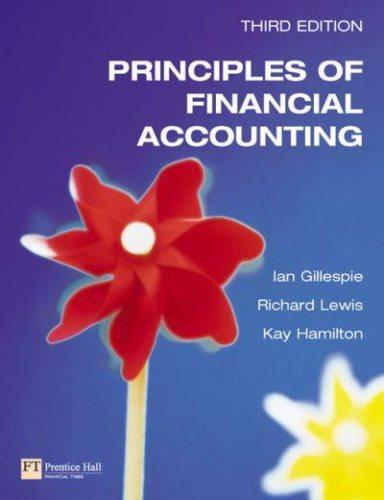2.6 Treat each of the following transactions separately. 1. On 3 November 20X3 Williams sold goods, for
Question:
2.6 Treat each of the following transactions separately.
1. On 3 November 20X3 Williams sold goods, for £7,000 cash, the cost of the goods to him being £5,000.
2. He received a legacy of £2,000 which he paid into his business bank account on 7 February 20X4.
3. He ordered a new van costing £9,000 on 15 March 20X4.
4. He received £13,000 from a customer on 1 November 20X3 in settlement of a debt.
5. In December 20X3 Williams sent the wrong type of goods to Smith. The goods which had cost Williams £2,500 were invoiced to Smith at £3,000. In January, Smith drew Williams’s attention to the error and Williams agreed the fault was his. Smith, who had not paid for the goods, returned them to Williams in January. Analyse the January transaction.
6. As (5) except that Smith had paid for the goods before discovering the error.
7. Williams paid his rent in arrears. On 2 January 20X4 he paid £5,000 for the quarter from 1 October 20X3 to 31 December 20X3.
8. On 13 October 20X3 Williams withdrew £500 from his business bank account for his own use.
9. Some of the goods sold on 5 November 20X3 by Williams to Jones were defective. The selling price of the goods was £10,000, the cost price was £8,000. After some corre¬ spondence, Williams agreed, on 1 December, that the matter would be settled by his reducing the selling price from £10,000 to £9,500. Jones had not paid for the goods by 1 December. Analyse the December transaction.
10.Davies ordered 2 gross of goods from Williams in December 20X3. Since Williams did not know Davies, he asked Davies to pay a deposit of £3,000 which Davies did on 18 December 20X3; Williams thereupon ordered the goods from his supplier on 20 December 20X3. He received the goods on 5 January 20X4; the goods cost Williams £4,500. Williams sent them to Davies on 12 January, invoicing him for Paid rent on the business premises, £12,000 in respect of the six months to 30 June 20X0.
Purchased goods on credit from Dawe for £17,500.
Purchased goods for cash £23,000.
Ordered a van, priced at £40,000 from Ivor on credit.
Sold half the goods bought on 2 January to Anne on credit for £12,000. Sold for cash
£6,000. Williams paid his supplier on 10 February 20X4 and Davies paid Williams the balance due on 22 February 20X4. Analyse all the above transactions.
Complete an analysis sheet (as used in Figure 2.3, but keeping each transaction separate), recording the above transactions.
Step by Step Answer:

Principles Of Financial Accounting
ISBN: 9780273676300
3rd Edition
Authors: Ian Gillespie, Richard Lewis, Kay Hamilton





